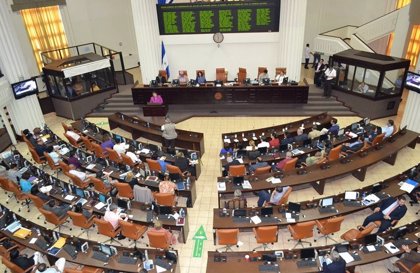Nicaragua’s congress is considering legislation that could cripple independent journalism here, press advocates say, the latest step in a crackdown on opposition voices launched by President Daniel Ortega following nationwide protests in 2018.
One bill would require journalists who work for international media to register with the government as foreign agents and to refrain from “intervening in questions, activities or matters of internal politics.”
A second bill would establish jail terms of up to four years for those who used a computer to spread “false and/or misrepresented information which causes alarm.” Critics say the proposed Special Law on Cybercrimes could be used to target journalists or social media users writing anything unfavorable to the government.
Ortega’s Sandinista party holds a majority in congress and can easily pass the legislation. A vote could come as soon as this week.
Concern is rising for the free press in Central America. More than 500 journalists, writers and artists signed a recent letter to the Inter-American Commission on Human Rights protesting attacks on the media in El Salvador.
That country’s president, Nayib Bukele, announced last month that he was investigating the independent news site El Faro for alleged money laundering after it published an expose on secret government negotiations with gangs.
In Honduras, the government suspended the right to free expression at the start of the covid-19 pandemic, then backtracked after a public outcry. Two journalists have been shot and killed in the country this year; another died in prison after being convicted of defamation.
Natalie Southwick, Central and South America program coordinator for the Committee to Protect Journalists, said conditions for independent journalists in the region were already difficult. But the pressures “seem to really be expanding and getting worse right now,” she said in an interview.
The bills introduced in Nicaragua in the past two weeks are the latest in a barrage of measures to curtail independent media. Security forces raided several news outlets in 2018, after mass protests erupted calling for Ortega’s ouster. Authorities blocked imports of newsprint for the country’s leading daily, La Prensa, for 18 months. Scores of journalists have fled the country after suffering harassment.
Julio López, director of the organization Independent Journalists and Communicators of Nicaragua, said the new legislation “represents the continuity of the regime’s repression of independent journalism.”
Nicaraguan journalists have launched 20 online news publications in the last two years. The government “wants digital media to not provide coverage of the crisis,” said López.
The Forum of Independent Press of Nicaragua, which represents media owners and editors, said the bills “threaten not just journalists and media, but also the freedom of expression of all Nicaraguans.”
Ortega came to power after the 1979 revolution spearheaded by leftist Sandinista rebels. He lost the 1990 election, but returned to the presidency in 2007 and has been reelected twice. He is expected to seek a new five-year term in elections next year.
Vice President Rosario Murillo, who serves as the government’s chief spokeswoman, did not respond to a request for comment on the legislation. Murillo is Ortega’s wife.
Wálmaro Gutiérrez, a lawmaker from Ortega’s party, said the proposal on “foreign agents” was necessary to regulate people “who respond to foreign interests and financing, and use this financing to carry out activities that represent the interference of foreign governments or organizations in the internal affairs of Nicaragua.”
It would apply to journalists and organizations that receive funding from abroad. They would be required to provide information on their financial transactions and activities. Roughly a dozen journalists in Nicaragua are employed by foreign media outlets or contribute as freelancers to organizations including The Washington Post.
Michael G. Kovak, the acting U.S. assistant secretary of state for the Western Hemisphere, tweeted that the law was “a dangerous affront to democracy in Nicaragua.”
The Trump administration has imposed sanctions on Nicaraguan officials, the National Police and members of Ortega’s family since the government quashed the 2018 protests, leaving more than 300 dead.
A Nicaraguan political analyst, José Luis Rocha, said Ortega might have introduced the legislation at this moment to send a message to Washington.
“He’s convinced that more sanctions are coming,” Rocha said. “And he’s cracking down at a time when everyone is focused on the elections in the United States.” (https://www.washingtonpost.com/world/the_americas/nicaragua-ortega-foreign-media-law/2020/10/04/f6e38f44-064f-11eb-859b-f9c27abe638d_story.html)






































